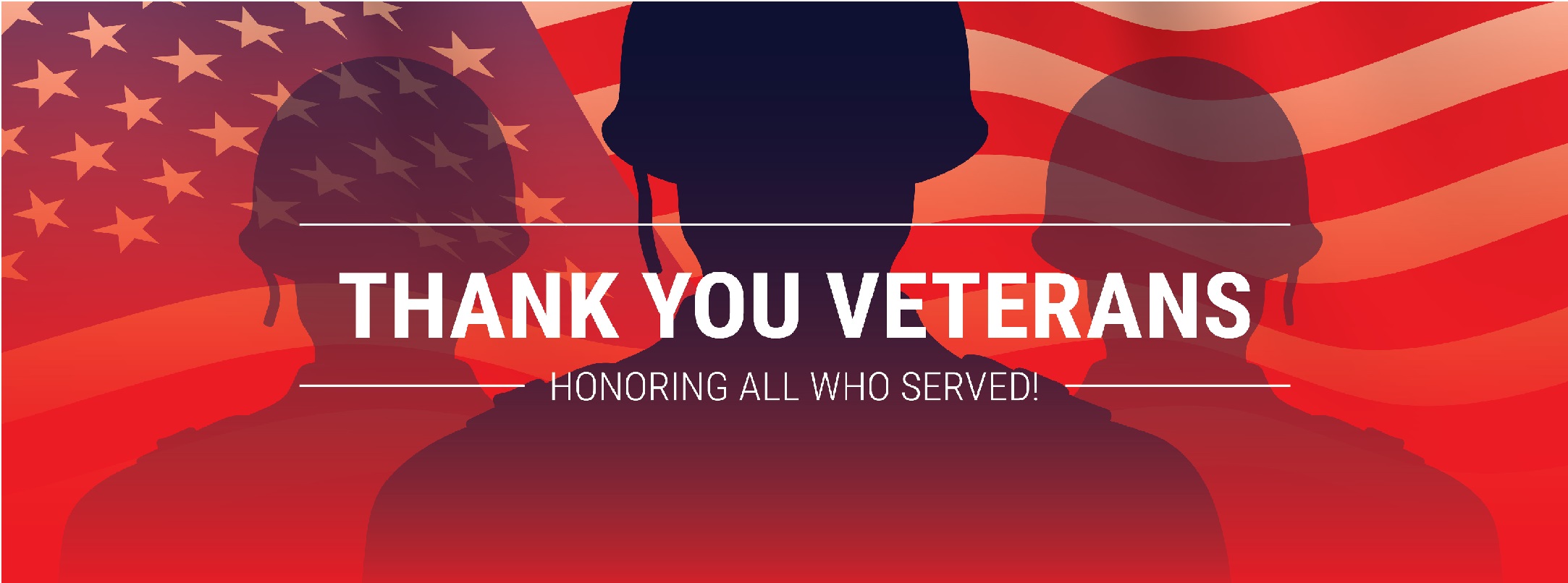Adjusting to civilian life can be a little easier with access to certain VA benefits. However, with so many veterans benefits programs available, it can be difficult to know which ones you’re entitled to or how to sign up for them. We have compiled a list of veterans programs in this ultimate veterans benefits guide, including eligibility requirements and what each provides.
What Benefits are Available for Veterans?
If you served in the military, you may be eligible for VA benefits. Veterans programs can help veterans cover the cost of education, health care, and medical costs after serving. Some of these programs may also assist with financial hardships or obtaining a home loan. Veterans are eligible for a series of benefits, including:
Disability Compensation
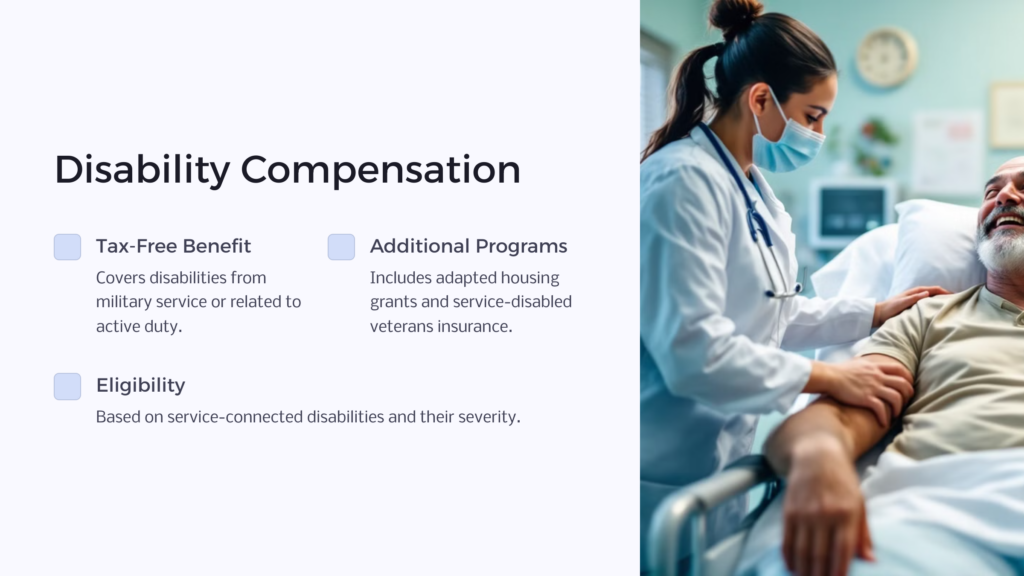
Veterans may be entitled to disability compensation. Disability compensation is tax-free and covers disabilities that occur as a result of military service. Some disabilities that occur after service may also be eligible for disability compensation, as long as they’re related to active duty service. You can refer to our article on VA disability rates for more information.
In addition to programs like dependency, indemnity, and special monthly compensation, injured veterans may also qualify for adapted housing grants or service-disabled veterans insurance.
Pension
The Veterans Pension and Survivors Pension programs are designed to help veterans with supplemental income following financial difficulties. The veteran’s pension includes tax-free funds for low-income veterans.
The veteran survivors pension program is available to low-income spouses who never remarried or a veteran’s children who are also not married. Eligibility for the pension program requires veterans to be at least 65 years or older with no or limited income, total or permanent disability, currently living in a nursing home or receiving skilled nursing care, and receiving either Social Security Disability Insurance (SSDI) or Supplemental Security Income (SSI).
Education and Training
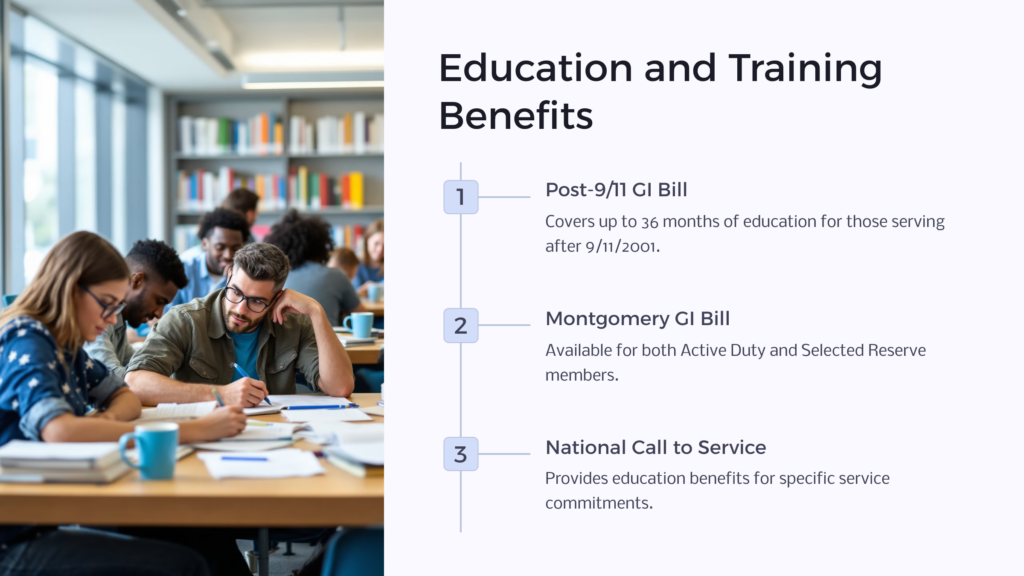
Veterans can further their education through education and training programs. These programs are designed to help veterans build on their existing skills from the military or develop new ones so that they can find employment as civilians.
Some higher education programs available to veterans include:
-
Post-9/11 GI Bill
-
Montgomery GI Bill-Active Duty
-
Montgomery GI Bill-Selected Reserve
-
National Call to Service (NCS)
The most common and well-known educational program available to veterans is the Post-9/11 GI Bill. This bill helps active duty members and veterans cover the costs of school. You must have served on or after September 11, 2001, for at least 90 days of active service to qualify for the Post-9/11 GI Bill. You can expect the VA to cover up to 36 months of education if qualified. This program covers costs like tuition, fees, moving costs, housing allowance, books, and supplies.
Health Care
Veterans qualify for health care through the Veterans Health Administration program. The program requires veterans receive medical care at one of their almost 1,300 approved facilities to be eligible for coverage. The program covers medical costs to treat illnesses and injuries. It also covers expenses related to preventative care and improving your overall quality of life.
Home Loans
VA home loans help veterans buy homes at lower rates and with no down payment requirements. The program also limits closing costs and drops private mortgage insurance (PMI) requirements, which can decrease mortgage payments by a couple of hundred dollars a month.
Veterans who already have a mortgage can use the Interest Rate Reduction Refinance Loan (IRRRL) to refinance a loan at a lower interest rate. The Native American Direct Loan (NADL) program helps Native American veterans buy or build on federal trust land. Adapted housing grants are also available to veterans and help with renovating a home to accommodate disabilities. Some veterans may also qualify for foreclosure assistance, which is a program that provides financial counseling services to those at risk of losing their homes.
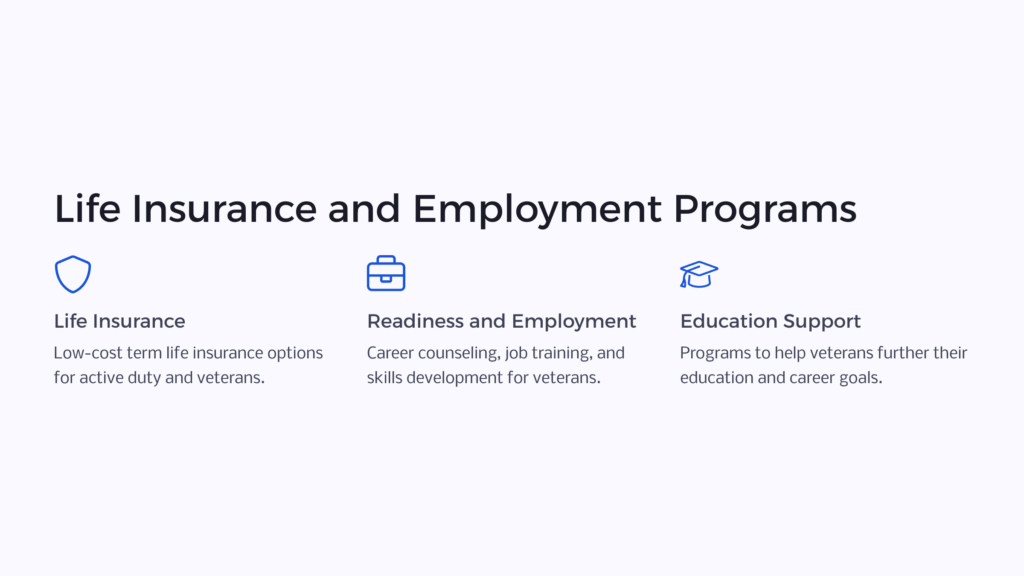
Life Insurance
Veterans also receive life insurance in the form of low-cost term life insurance. The Servicemembers’ Group Life Insurance (SGLI) is a low-cost life insurance program for active duty members. The Servicemembers’ Group Life Insurance Traumatic Injury Protection (TSGLI) is an extension of the SGLI program for veterans who suffer traumatic injuries.
The Veterans’ Group Life Insurance (VGLI) allows veterans to convert their active duty life insurance to civilian life insurance. Another life insurance program available to veterans is the Service Disabled Veterans Life Insurance (S-DVI), which covers disabled veterans who want a higher value of life insurance.
The Veterans Mortgage Life Insurance (VMLI) offers mortgage insurance coverage to disabled veterans who are also a part of the VA Specially Adapted Housing (SAH) program. The Veterans Affairs Life Insurance (VALife) is a new program that, as of 2023, offers up to $40,000 in life insurance to veterans with disabilities with guaranteed approval rates.
Veteran Readiness and Employment Program
The Veteran Readiness and Employment Program (VR&E) helps veterans prepare for other careers after active duty through education, job training, and job-seeking skills. This may include things like career counseling or resume review services. This program also covers helping veterans learn skills to start their own business or learn to live solo after a disability.
This program may also extend to family members who are the primary caregiver of a disabled veteran. The VA can help family members evaluate their career goals and skills.
Burial Expenses
The VA provides compensation to families to help cover the cost of burial and other related expenses for veterans. The program offers up to $796 for non-active-duty-related deaths and up to $2,000 for active duty-related burials.
Veteran Crisis Line
Veterans who want access to confidential crisis support can reach out to the Veterans Crisis Line by dialing 988, then pressing 1. This chat line is also open to veteran families.
What Benefits Are Available to Senior Veterans?
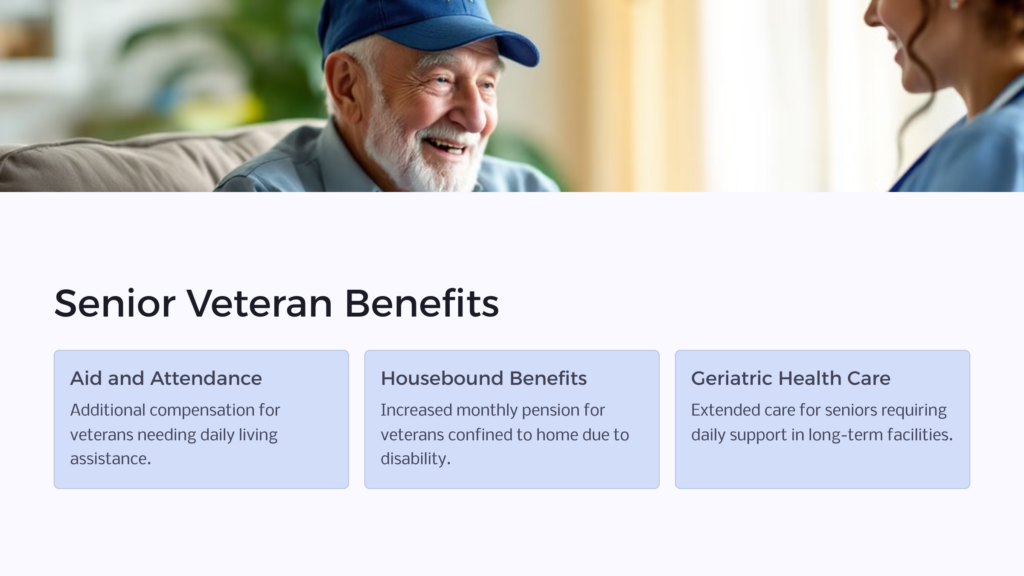
In addition to these benefits, senior veterans may qualify for additional ones, including:
Aid and Attendance (A&A)
The A&A program provides additional compensation to veterans already receiving a VA pension. To qualify, veterans must be bedridden, require assistance with daily living tasks, have limited eyesight, or be a patient in a nursing home.
Housebound
Some veterans may also receive additional compensation if they’re housebound. This means being confined to a home due to a permanent disability. Housebound benefits include an increased monthly pension payment.
Geriatric Health Care
Geriatric health care or extended care is available to senior veterans who require daily support with basic living requirements, like dressing or bathing. These VA health care benefits are for veterans in a long-term care center or VA hospital.
Do Veterans Get Benefits for Life?
The length of your veterans benefits depends on the specific benefit and your VA disability rating. Most VA disability benefits are not for life. Instead, they’re routinely subject to review by the U.S. Department of Veterans Affairs. However, if your conditions are the same, they’re likely to extend your benefits.
If the VA determines that your situation, specifically your disability, has changed, they may assign you a new rating. Depending on what the new rating is, it may affect your VA benefits.
Other VA benefits have a time rating. The Post-9/11 GI Bill, for example, is limited to 48 months of benefits for up to 15 years after your separation date. The VA hospital also covers veterans for up to 120 days from the date of separation. If the veteran is totally disabled at the time of separation, this time period may extend for up to two years.
Veterans over the age of 65 years may qualify for additional benefits, especially if they require services due to an active duty-related disability.
Do Wives and Family of Veterans Receive Benefits?
Wives and family members of veterans may also receive benefits. Some programs that also extend eligibility to family members include:
-
Dependency and indemnity compensation: This tax-free payment goes to surviving family members if a veteran loses life during active duty. This benefit also covers family members of veterans who lose their life from a service-related injury, even if they’re not currently on active duty.
-
Special monthly compensation: This tax-free payment goes to veterans and eligible family members. This benefit is higher than other benefits and is designed to cover the cost of assistance to accommodate a disability.
-
Veterans survivors pension: This tax-free program is available to surviving wives who never remarried or children who are not married. The program provides eligible family memes with monthly payments, as long as they meet current income requirements.
-
Family Servicemembers’ Group Life Insurance (FSGLI): FSGLI is life insurance that extends to a veteran’s family. The plan offers insurance up to $100,000 for spouses and up to $10,000 for dependent children.
-
Veteran Readiness and Employment (VR&E): The VR&E program may extend to family members who pursue certain careers and who are also responsible for supporting a veteran with a disability. The plan covers topics like education and career counseling, readjustment counseling, career assessments, and children with disabilities.
Surviving spouses may also qualify for other VA programs, like home loan programs or financial counseling. Eligibility for these programs depends on unique requirements for each one.
How Long Do You Have to Serve to Receive Help From the Government?
You must serve anywhere between 90 days to 24 months in active duty to receive government benefits, depending on the date in which you served. The length that you need to serve to qualify also depends on the type of benefits.
For example, to become eligible for the VA pension program, you must be at least 65 years of age and serve at least 90 days if you were an active duty service member on or before September 7, 1980. If you served after this date, you must have served at least 24 continuous months with at least one day during wartime.
For the home loan guarantee program, you must serve at least 90 days or more on active duty during a wartime veteran period or at least six years of service in the Selected Reserve or National Guard. State veteran programs also have unique requirements, depending on the plan.
How Do I Know What I Qualify for as a Veteran?
Knowing which ones you’re eligible to receive can be difficult with so many veteran programs. Some veteran benefits are available to most veterans, like the VA Home Loan Program. Other benefits, like the VA Pension Program, are reserved for veterans who are at least 65 years old and in a nursing home or long term care center for a disability or those already receiving funds through SSDI or SSI.
You could review the different requirements of each of the veteran programs. You could also work with a third-party provider to help you decide which veteran benefits you’re eligible to receive. There are specialized companies that are dedicated to helping veterans with disabilities access the benefits they deserve. We understand how difficult it can be to track down the assistance you need.
You can also subscribe to different military resources and official websites, like the Department of Veterans Affairs or Military.com, to keep up with changes. These sites often have information on the latest rules and laws of programs and benefits that affect veterans.
How Can I Apply for Disability as a Veteran?
Applying for disability as a veteran can provide you with the funds you need to manage daily costs. You can apply for disability as a veteran by submitting an application with the VA. You can do this with the following steps:
-
Determine your eligibility
Determining your eligibility ahead of time can save you time and money. To qualify for VA disability, you must have a current condition that affects your mind or body. You must have also served active duty, active duty for training, or inactive duty training.
In addition to this, you must meet at least one of the following criteria:
-
You became sick or injured while serving
-
Serving made a pre-existing condition worse
-
A condition arose after serving active duty directly related to your service
Eligible conditions included in disability are chronic illnesses, illnesses from toxic chemicals or hazardous materials, or an illness from being a prisoner of war. Both veterans and their qualified dependents are eligible for the VA disability program.
-
Collect all supporting documents
You’ll need certain documents to accompany your VA disability application. A few documents to collect before filling out your application include:
-
VA medical records
-
Private hospital or doctor medical records
-
Witness statements (such as testimonies from family or friends)
-
Separation documents or your DD214
-
Testing or diagnostic records
-
Completed statement
Depending on the type of disability, you may need additional documents. If you believe you’re qualified for VA disability but you’re unable to track down these documents, we may be able to help. We understand the challenges of building a case that accurately demonstrates your unique disability.
-
Fill out and submit your application
You can fill out and submit your disability application in one of four ways:
-
Online: Fill out and submit your disability application online at VA.gov.
-
By mail: You can also send in a paper copy of your disability application to the Department of Veterans Affairs, Claims Intake Center, PO Box 4444, Janesville, WI, 53547-4444.
-
In-person: You can fill out and submit a disability application in person at your nearest VA office.
-
Third-party: If you need help filling out your application or you want someone to double-check it, you can use a third party company.
Including all the required documents and evidence with the application the first time can help speed up the process. This can also reduce the chances of your disability application being denied.
-
Await Answer
Once you submit your disability application, you don’t need to do anything else. The average time from application to answer is approximately 125.3 days.
How Can I Apply for Unemployment as a Veteran?
Unemployment benefits are available to veterans through the Unemployment Compensation (UCX) program. To qualify for unemp
oyment benefits as a veteran, you must have been on active duty with a branch of the U.S. military. You must have separated from the U.S. military on honorable conditions. The federal government doesn’t deduct unemployment wages from your pay when serving in the military.
However, you’re still eligible to use unemployment benefits. You can apply for unemployment as a veteran by visiting your state’s unemployment office. The benefits that you’re entitled to vary, depending on your state.
Filing for veteran unemployment benefits is easy. You can apply in person with proof of a Certificate of Release or Discharge from Active Duty, a copy of your social security card, and a list of your job history or more recent resume.
Does Texas Offer Special Benefits to Veterans?
Veterans who live in Texas may qualify for additional state benefits in addition to the ones available through the federal government. Some Texas veterans benefits include:
Access to Veterans’ Homes
There are nine veterans’ long-term homes in Texas open to honorably discharged veterans. The homes are also available to a veteran’s spouse or a surviving spouse who isn’t remarried. The state also allows Gold Star Parents to reside in veteran’s homes. The cost to live in a long-term veteran’s home in Texas depends on income. You can find veterans’ long-term homes in the following Texas cities:
-
Amarillo
-
Big Spring
-
Bonham
-
El Paso
-
Floresville
-
McAllen
-
Temple
-
Tyler
These long term care homes are typically more affordable than traditional care homes. They may be a great option for veterans or veteran family members who require 24/7 care.
Property Tax Exemptions
Veterans who own a home in Texas may be eligible for property tax exemptions. Veterans and their spouses who are 100% disabled may qualify for a complete property tax exemption. Eligible veterans who are between 10-90% disabled may qualify for a reduced assessed value of between $5,000-$12,000.
Reduced License Costs and Disabled Plates
Veterans who are at least 60% disabled in Texas are eligible for a free driver’s license. Some Texas veterans may also qualify for parking privileges or disabled license plates and parking placards. Veterans must be a minimum of 50% disabled to qualify for a disabled veteran license plate or parking placard.
A veteran with a Disabled Veteran, Air Force Cross, Distinguished Service Cross, Army Distinguished Service Cross, Navy Cross, Pearl Harbor Survivor, Purple Heart, Prisoner of War, or Congressional Medal of Honor license plate may park anywhere designed for those with disabilities. They’re also permitted to park for free at any government parking meter, as long as the vehicle is driven by the veteran.
Veterans are also allowed to park for free at the Dallas Fort Worth Airport. Veterans can apply for these programs through the Texas Department of Transportation.
Texas Veterans Home Loans
Veterans who are at least 30% disabled and want to buy a home in Texas may qualify for below-market-interest rate home loans. The Texas Veterans Land Board (VLB) also offers land loans up to $150,000 for veterans with only a 5% down payment requirement.
Texas Home Improvement Loans
The Veterans Home Improvement Program (VHIP) helps veterans complete necessary renovations to their homes with loans up to $50,000 for up to 20 years. Veterans who are at least 30% disabled can receive even lower interest rates for home renovations.
Hazelwood Act
The Hazelwood Act covers the cost of up to 150 hours of education for veterans, veterans’ spouses, or veterans’ children. This act covers additional education beyond that of what’s available through the federal VA education benefits. Veterans must complete their education at a state-supported college or university. To qualify for this program, the veteran must have been a legal resident of Texas when serving on active duty. The state also requires veterans to not be in default of any student or federal education loans.
Legacy Act
The Legacy Act allows veterans to use the Hazelwood Act to cover a spouse’s or child’s educational costs.
Employment Benefits
Texas also offers a series of employment benefits to veterans, including Veterans Preference, which gives military members and their spouses preferred employment with state agencies. The state also allows state employees to count military time toward retirement, up to a total of 60 months.
Texas employment representatives also help veterans fill out job applications, create a resume, or prepare for interviews. More in-depth employment services are also available to veterans who are seeking employment but who are also homeless. As for extended unemployment benefits, Texas residents may also qualify for may be available during times of high state or federal unemployment.
The unemployment office can also connect you to veterans service organizations that may hold career fairs in your area.
Entrepreneur Program
Texas helps veterans gain the skills and knowledge they need to start a business with the Entrepreneur Program.
Recreational Benefits
Texas veterans also qualify for recreational benefits, including free hunting or fishing licenses and free admission to state parks for at least 50% disabled veterans. Veterans can also waive their concealed handgun license fees as long as they were honorably discharged from active duty within the last 365 days and are at least 50% disabled.
Free Burial
Texas veterans and their dependents are entitled to free burial benefits at one of Texas’ four veterans’ cemeteries. Veterans can learn more about these cemeteries by visiting the Texas Veterans Land Board or contacting the National Cemetery Administration directly.
Medical Record and Transfer Benefits
Veterans in Texas are eligible to receive free official discharge military records from their county clerk. They’re also eligible for no-cost medical records when used to file a disability claim.
Veterans who call Texas home have a lot of extra benefits. This link can help you learn more about Texas veteran benefits.
How Can I Get Help With Medical Bills as a Veteran?
Many programs available to veterans through the Veterans Benefits Administration may help them with medical bills. Veterans can request VA financial hardship assistance from the United States Department of Veterans Affairs (VA). The program offers two options, which include:
-
Repayment plan
-
Debt relief for medical copay payments
Some veterans may also qualify for a medical copay exemption if they meet certain income requirements. Recent changes in the law also prevent medical providers from reporting veterans’ medical debt to the consumer reporting agencies without first exhausting all collection efforts.
What Should I Know Before Applying for Help as a Veteran?
VA programs, including health benefits and financial assistance programs, can be useful as you transition into civilian life. The application process and wait times can be lengthy. Submitting your claim accurately the first time can help you access your benefits faster. Depending on the complexity of your case, outsourcing claims assistance may be the best way to get the benefits you deserve.
Some benefits may also require medical records and release papers. You may want to request military records ahead of time to speed up the process.
 Benefits.com Advisors
Benefits.com Advisors
With expertise spanning local, state, and federal benefit programs, our team is dedicated to guiding individuals towards the perfect program tailored to their unique circumstances.
Rise to the top with Peak Benefits!
Join our Peak Benefits Newsletter for the latest news, resources, and offers on all things government benefits.















